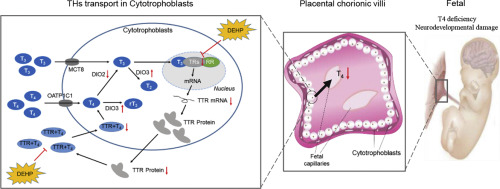Toxicology and Applied Pharmacology ( IF 3.3 ) Pub Date : 2020-03-20 , DOI: 10.1016/j.taap.2020.114960 Zhi-Ping Du 1 , Shun Feng 1 , Yan-Ling Li 1 , Rong Li 1 , Jia Lv 1 , Wen-Qiang Ren 1 , Qiang-Wei Feng 1 , Ping Liu 2 , Qu-Nan Wang 1

|
During pregnancy, fetal thyroid hormones (THs) are dependent on maternal placental transport and their physiological level is crucial for normal fetal neurodevelopment. Earlier research has shown that Di-(2-ethylhexyl) phthalate (DEHP) disrupts thyroid function and THs homeostasis in pregnant women and fetuses, and affects placental THs transport. However, the underlying mechanisms are poorly understood. The present study, therefore, aimed to systematically investigate the potential mechanisms of DEHP-induced disruption in the placental THs transport using two human placental trophoblastic cells, HTR-8/SVneo cells and JEG-3 cells. While the exposure of DEHP at the doses of 0–400 μM for 24 h did not affect cell viability, we found reduced consumption of T3 and T4 in the culture medium of HTR-8/Svneo cells treated with DEHP at 400 μM. DEHP treatment did not affect T3 uptake and the expression of monocarboxylate transporters 8 (MCT8) and organic anion transporters 1C1 (OATP1C1). However, DEHP significantly inhibited transthyretin (TTR) internalization, down-regulated TTR, deiodinase 2 (DIO2), and thyroid hormone receptors mRNA expression and protein levels, and up-regulated deiodinase 3 (DIO3) protein levels in a dose-dependent manner. These results indicate that DEHP acts on placental trophoblast cells, inhibits its TTR internalization, down-regulates TTR expression and affects the expression of DIO2, DIO3, and thyroid hormone receptor. These may be the mechanisms by which PAEs affects THs transport through placental.
中文翻译:

邻苯二甲酸二-(2-乙基己基)酯抑制人胎盘滋养层细胞中运甲状腺素蛋白的表达和内化。
怀孕期间,胎儿甲状腺激素(TH)依赖于母体胎盘运输,其生理水平对于正常胎儿神经发育至关重要。早期研究表明,邻苯二甲酸二(2-乙基己基)酯 (DEHP) 会破坏孕妇和胎儿的甲状腺功能和 THs 稳态,并影响胎盘 THs 转运。然而,人们对潜在机制知之甚少。因此,本研究旨在使用两种人胎盘滋养层细胞(HTR-8/SVneo 细胞和 JEG-3 细胞)系统地研究 DEHP 诱导的胎盘 THs 运输中断的潜在机制。虽然暴露 0–400 μM 剂量的 DEHP 24 小时不会影响细胞活力,但我们发现用 400 μM DEHP 处理的 HTR-8/Svneo 细胞培养基中 T 3和 T 4的消耗减少。 DEHP处理不影响T 3摄取以及单羧酸转运蛋白8 (MCT8)和有机阴离子转运蛋白1C1 (OATP1C1)的表达。然而,DEHP 显着抑制运甲状腺素蛋白 (TTR) 内化,下调 TTR、脱碘酶 2 (DIO2) 和甲状腺激素受体 mRNA 表达和蛋白质水平,并以剂量依赖性方式上调脱碘酶 3 (DIO3) 蛋白质水平。这些结果表明DEHP作用于胎盘滋养层细胞,抑制其TTR内化,下调TTR表达并影响DIO2、DIO3和甲状腺激素受体的表达。这些可能是 PAE 影响 TH 通过胎盘转运的机制。











































 京公网安备 11010802027423号
京公网安备 11010802027423号